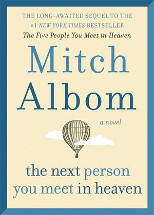The next person you meet in heaven by Mitch Albom

Hachette, 2018. ISBN 9780751571899
(Senior secondary - Adult) Deeply evocative of the anguish we
experience when someone we love dies, this story is constructed as
both a reflection on life and a conversation with those who have
died. Mitch Albom tells the story of one woman, Annie, who is killed
in a freak accident, taking us through her life and the five lessons
that she experiences when she 'meets' five people who were part of
her life on earth.
Definitely unusual and slightly difficult to comprehend at the start
of the novel, this is not so much a story as a treatise on love,
care, generosity, decency and the values that we often overlook in
our busy lives. As Albom delves deeply into the reality of our
tendency to feel guilty when someone dies, so we begin to understand
that what is more relevant to our living on this earth is to
connect, to feel, to think about and to cherish those with whom we
live and those with whom we come into contact. Essentially this book
is about that idea of really connecting with others that enables us
and offers a renewed spirit in ourselves and in those with whom we
spend time, even if it is only a passing meeting or a short time.
Underlying the narrative is the feeling of guilt that pursues the
soul of those whose actions have caused the death of others, be it
strangers or loved family members. Moving between this temporal life
and that one he proposes as the spiritual life of heaven, Albom
positions us to see accidents from the survivor's point of view as
well as that of the ones who died. At its heart is that notion of
the incredible capacity of people to forgive others, and he proposes
that those who cannot forgive themselves suffer enormously. Hence we
are led to see the ending of a life and Albom's proposition of the
idea of 'heaven' as a simple concept. He writes of the value and
quality of what we offer others as intensely precious. Indeed, his
proposition is that the soothing balm of loving forgiveness heals
the pain of those who have hurt others.
Whether or not his afterlife reflects a possible life after death,
this little story posits the notion of loving kindness when fate
causes death. It proposes a connection between this world and
another, the 'afterlife', and this author asserts the inestimable
value of forgiveness as an act of goodness that has the capacity to
heal even the most damaged soul.
Elizabeth Bondar